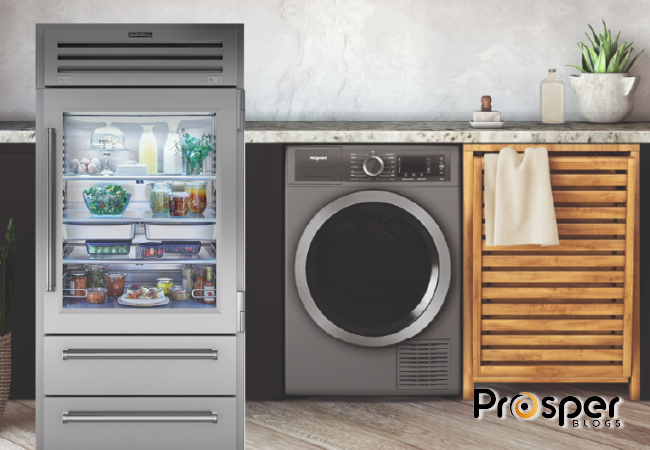
Energy-Efficient Appliances: A Guide to Sustainable Living at Home
Introduction:
In the pursuit of a more sustainable and eco-friendly lifestyle, one of the most impactful steps individuals can take is to embrace energy-efficient appliances in their homes. These appliances not only contribute to reducing energy consumption but also lead to cost savings over time. In this comprehensive guide, we will explore the significance of energy-efficient appliances, highlight their environmental and economic benefits, and provide practical tips for incorporating them into your home, paving the way for a more sustainable and prosperous future.
Understanding Energy Efficiency: What Makes Appliances Efficient?
Energy efficiency in appliances is measured by their ability to perform a task while consuming the least amount of energy. This is often indicated by an Energy Star rating, an internationally recognized symbol for energy efficiency. Key factors that contribute to the efficiency of appliances include:
Energy Star Certification: Look for the Energy Star label, which signifies that the appliance meets specific energy efficiency criteria set by environmental protection agencies.
Innovative Technologies: Appliances with advanced technologies, such as inverter compressors in refrigerators or variable-speed motors in HVAC systems, are designed to optimize energy usage.
Smart Features: Some modern appliances come with smart features that allow users to monitor and control energy consumption remotely, contributing to more informed and efficient use.
Environmental Benefits of Energy-Efficient Appliances: Reducing Carbon Footprint
Investing in energy-efficient appliances directly contributes to environmental conservation. The benefits include:
Lower Greenhouse Gas Emissions: Energy-efficient appliances consume less energy, reducing the demand for power generation. This, in turn, leads to lower greenhouse gas emissions from power plants, helping combat climate change.
Resource Conservation: Reduced energy consumption means lower demand for natural resources used in power generation, such as coal or natural gas. Energy efficiency contributes to the conservation of these valuable resources.
Less Strain on Power Grids: Energy-efficient appliances help alleviate the strain on power grids, reducing the need for new power plants and infrastructure. This results in a more resilient and sustainable energy system.
Economic Benefits: Long-Term Savings and Return on Investment
While the initial cost of energy-efficient appliances may be slightly higher, the long-term economic benefits far outweigh the upfront investment. These benefits include:
Lower Utility Bills: Energy-efficient appliances consume less electricity, leading to significant reductions in monthly utility bills. Over time, these savings can offset the initial purchase cost.
Return on Investment (ROI): The lifespan of energy-efficient appliances often exceeds that of traditional models. With lower energy bills and potential rebates or incentives, the return on investment becomes evident over the life of the appliance.
Increased Property Value: Energy-efficient homes are increasingly attractive to buyers. Installing energy-efficient appliances not only enhances the value of your property but also positions it as a sustainable and cost-effective investment.
Common Types of Energy-Efficient Appliances: Making Informed Choices
When transitioning to a more energy-efficient home, it's essential to focus on key appliances that have a significant impact on energy consumption. These include:
Energy-Efficient Refrigerators: Newer refrigerators often come with advanced insulation and inverter compressors, optimizing temperature control and reducing energy consumption.
High-Efficiency HVAC Systems: Heating, ventilation, and air conditioning (HVAC) systems with variable-speed motors and smart thermostats can significantly reduce energy usage for climate control.
LED Lighting: LED bulbs are not only more energy-efficient but also have a longer lifespan than traditional incandescent bulbs, contributing to reduced waste.
Energy-Efficient Washing Machines and Dishwashers: Front-loading washing machines and dishwashers with high Energy Star ratings use less water and energy per cycle, making them more environmentally friendly.
Smart Thermostats: These devices learn users' preferences and adjust heating and cooling accordingly, optimizing energy usage and reducing overall consumption.
Tips for Incorporating Energy Efficiency into Your Home: A Sustainable Lifestyle
Embracing energy efficiency goes beyond purchasing new appliances. Here are practical tips for incorporating sustainable living practices into your home:
Regular Maintenance: Ensure that appliances are well-maintained, with clean filters and coils. Regular maintenance improves efficiency and extends the lifespan of appliances.
Unplug Devices: Even when turned off, electronic devices can consume energy in standby mode. Unplug devices or use smart power strips to prevent energy wastage.
Optimize Water Usage: Energy-efficient appliances often coincide with water efficiency. Be mindful of water usage, repair leaks promptly, and consider water-saving appliances for a holistic approach to sustainability.
Invest in Renewable Energy: Consider installing solar panels or other renewable energy sources to power your home. This further reduces reliance on traditional power grids and minimizes environmental impact.
Educate and Involve Family Members: Foster a culture of energy efficiency within your household by educating family members about the importance of sustainability and encouraging mindful energy practices.
Government Incentives and Rebates: Maximizing Savings
Many governments offer incentives and rebates to encourage the adoption of energy-efficient appliances. Research and take advantage of these programs, which may include tax credits, rebates, or subsidies for qualifying appliances. These incentives not only reduce the initial cost but also enhance the overall economic benefits of adopting energy-efficient practices.
Community Impact: Inspiring Sustainable Living Practices
Beyond personal benefits, adopting energy-efficient appliances contributes to a broader culture of sustainability within communities. By leading by example, individuals can inspire neighbors and friends to embrace energy efficiency, creating a ripple effect that extends to the community level. Community initiatives and sharing success stories amplify the impact of sustainable living practices.
Technological Advancements: The Future of Energy-Efficient Appliances
The field of energy-efficient appliances is continually evolving with advancements in technology. The future holds exciting possibilities, including:
Artificial Intelligence Integration: Smart appliances will become even smarter with the integration of artificial intelligence, learning user preferences and optimizing energy consumption based on individual habits.
Wireless Charging Technologies: Wireless charging for devices and appliances will become more prevalent, reducing the need for energy-consuming cords and cables.
Advanced Energy Storage: Improved energy storage solutions will enable homes to store excess renewable energy, further reducing dependence on traditional power grids.
Conclusion: A Sustainable Home for a Prosperous Future
Embracing energy-efficient appliances is a meaningful step toward creating a sustainable and prosperous future. The environmental benefits, economic savings, and overall improvement in quality of life make the transition to energy efficiency a win-win for individuals and the planet. By making informed choices, incorporating sustainable practices, and advocating for energy efficiency within communities, individuals can contribute to a more sustainable world—one energy-efficient appliance at a time. As we strive for a prosperous future, the journey begins at home with conscious decisions that positively impact the environment, our wallets, and the well-being of future generations.









